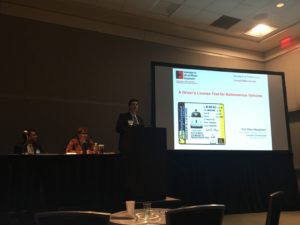 CCC Chair Elizabeth Mynatt from Georgia Tech and former CCC Council member Shashi Shekhar from the University of Minnesota, Minneapolis, provided contributions to this post.
CCC Chair Elizabeth Mynatt from Georgia Tech and former CCC Council member Shashi Shekhar from the University of Minnesota, Minneapolis, provided contributions to this post.
How can we really be sure that autonomous vehicles are safe? Is a road test the way to do it, or do we need to test every software patch in a vehicle before it gets on the highway? Why did Walmart file a patent for robotic bee pollinators?
One of the Computing Community Consortium (CCC) sessions at the recent 2018 American Association for the Advancement of Science (AAAS) Annual Meeting in Austin, TX was on Transforming Cities, Transportation, and Agriculture with Intelligent Infrastructure and these important questions were brought up.
This well-attended session was moderated by CCC Chair Beth Mynatt, from Georgia Tech, and included speakers George Pappas (University of Pennsylvania), and Shashi Shekhar (University of Minnesota, Minneapolis). Mynatt also presented material related to Charlie Catlett’s (Argonne National Laboratory) work with the city of Chicago. The panelists discussed three critical areas of fundamental scientific research in intelligent infrastructure (cities, transportation, and agriculture), and the challenges and barriers to realizing these advances as part of economically sustainable systems.
The audience asked a number of questions after the session including a question about the safety of autonomous cars versus the safety of humans driving cars. Pappas responded and said that the reports are inconclusive. Different tests are showing that Tesla and Google are safer while other tests are still showing that humans are safer. What we don’t know is: are those data capturing routine situations or extreme situations? We need to start channeling the research on everyday scenarios that cause most accidents. Is mileage testing enough to ensure safety? Perhaps we need to do more than just drive a car. We need to also test every software patch in every car. It is not clear what the cause was, but just this week there was a tragic Uber accident that killed a pedestrian.
Another audience member asked each panelist if they had given thought to what the future of their sectors would look like? Shekhar responded and said in Agriculture, globally, food security is at risk due to growing population, climate change and higher protein demand in the increasingly prosperous developing world. We must help Africa improve farm productivity to ward off turmoil. Nationally, the farm run-offs are creating a large dead zone in Gulf of Mexico and toxic algal blooms in Lake Erie. We need to think about protecting water and soil quality; we also need to think about energy for agriculture. These inter-linkages will become very important; farmers must be involved in the decisions.
Mynatt also warned of a new form of digital divide where some cities and communities attract commercial interest but others do not unless incentives drive national investments. Moreover, we need national science policy and engineering approaches to drive consistent standards for technical interoperability and regional open data platforms to spur community engagement and innovation. A great example is the Western Pennsylvania Regional Data Center.
Finally, the implications for privacy were asked about. Pappas responded that there are huge privacy concerns, in design, communication, and sharing data. A unique problem in transportation is location data, how do you share location data to get reasonable estimates without knowing precisely where one is? Privacy is at a local level, but the utility is at the social level. Privacy technologies are going to be huge enablers for the sharing of data that is not currently happening.
Discussions continued well after the session was over. US Department of Agriculture scientists, as well as Cotton and Soybean Growers Association leaders, expressed interest in reducing water waste using cyber-physical systems. Furthermore, the international press covered efforts to design robotic bee pollinators as plan B for addressing bee colony collapse syndrome. Shekhar said that the robotic bees such as those in a recent Walmart patent filing will need to be augmented with spatial computing (e.g., flower mapping, dividing flowers among bees in a swarm, and pre-planning initial routes) to scale up to large farms. After all, without detailed terrain maps, in the first DARPA autonomous driving challenge in 2004, “None finished the course—the top-scoring vehicle traveled only 7.5 miles—and the prize went unclaimed”.
For more information see the CCC@AAAS website. The CCC has already done a lot of work in this space. See the Intelligent Infrastructure white paper series, which includes the MOBILITY21: Strategic Investments for Transportation Infrastructure & Technology, City-Scale Intelligent Systems and Platforms, and Intelligent Infrastructure for Smart Agriculture: An Integrated Food, Energy and Water System white papers. In addition, there have been a number of blog post including the NSF Workshop to Identify Interdisciplinary Data Science Approaches and Challenges to Enhance Understanding of Interactions of Food Systems with Energy and Water Systems blog post, From GPS and Virtual Globes to Spatial Computing-2020 blog post and a blog post about Shashi Shekhar’s Capitol Hill Presentation on Deconstructing Precision Agriculture.









